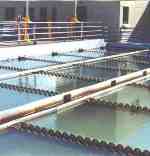
Should Capitalism Be King Over Water Treatment?
“Mark from Michigan” interpreted my November post about the cholera outbreak in Haiti as an argument for capitalism. This got me to thinking. Is Mark correct?
Most facilities providing water or wastewater treatment for the general public are owned by governments or government-like agencies. Despite this type of ownership, the output of these facilities is regulated by a combination of EPA, regional, state, and local regulations. Private companies such as banks, engineering firms, contractors, and a variety of OEMs build or retrofit these facilities. Under this model, the United States has some of the best water treatment in the world (see earlier Quiet Waters blog posts), indicating that government control has done well in this market.
Does this mean that private ownership does not have a place in our industry? Not exactly. Private ownership promises to provide the same quality of water at a lower cost. Some of this is by combining the services of multiple utilities, such as Human Resources, under a single structure, for example. Some comes from other aspects of operations. Sometimes it works, sometimes not, but that discussion is beyond the scope of this blog.
If we went with a completely privately run water treatment industry managed by government regulations, then we would have an arrangement similar to that found in the food, airline, and power industries. All of these sectors have experienced some form of collapse: remember when FDA-inspected facilities have produced food contamination or (Alaska Airlines Flight_261) FAA-inspected airplanes had to be grounded for proper maintenance? And recall when (American Airlines 1420) pilots were so concerned about violating daily duty limits that they put lives at stake.
Private market supporters also can find fault and multiple fines within the government-run water treatment sector (the most famous of which is the 1993 Milwaukee incident), as well as problems in other industries (Amtrak/Conrail and public schools). Obviously, government-run sectors are not perfect, either.
To further add to the debate, we all know that public money is available based on political desire ─ which has left the United States with an aging infrastructure problem. On the other hand, private industries want to maximize profits; one way to accomplish this is to decrease spending on improvements and maintenance. Thus, even with a private model, we could still wind up with underfunded infrastructure. Such a scenario played out in the railroad industry of the late 1960s and 1970s, which led to the formation of government-controlled Conrail. Thus, we cannot blindly say that private industry will solve our water infrastructure problems.
As a whole, properly managed private industry does an incredible job. Despite the examples above, the airline industry has one of the safest records of any transportation industry. Food contamination is rare and is usually caught quickly. Of course, in our government-owned water treatment system, water contamination is rare. This is mostly because there are regulators who are tasked with verifying records and fining agencies if they do not comply.
So what can be said in conclusion? Either public or private ownership of treatment facilities can provide effective treatment, but both of these market forms must be regulated by a solid set of government agencies to ensure treatment methods are followed. Suggesting that one method is a cure-all, as “Mark from Michigan” has done, ignores the fact that both methods can provide solid treatment if regulated correctly.
Posted by Grant Van Hemert, P.E., Schneider Electric Water Wastewater Competency Center on Dec 07, 2010